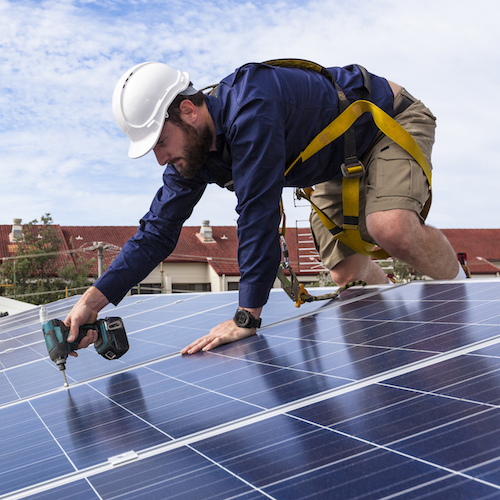
SunPower Corp. (NASDAQ: SPWR) reported fourth-quarter and full-year 2017 results after markets closed Wednesday. For the quarter, the solar panel maker reported adjusted earnings per share (EPS) of $0.25 on adjusted revenue of $824 million. In the same period a year ago, SunPower reported EPS of $0.02 on revenue of $1.1 billion. Fourth-quarter results also compare to consensus estimates for EPS of $0.11 and $797 million in revenue.
For the full year, SunPower posted an adjusted net loss per share of $0.25 and revenues of $2.13 billion, compared with 2016 EPS of $0.60 and revenue of $2.7 billion.
What’s killing the share price is the company’s future, not its past. The White House’s tariff on imported solar modules and panels has hurt the company’s outlook, and the forecast may get even worse.
CEO Tom Werner said:
Unfortunately, we are already seeing a negative near-term impact from the [tariff] ruling as the increased costs due to import tariffs have delayed certain 2018 projects and made other projects uneconomical. We have also put our planned $20 million U.S. employment expansion on hold and are considering other significant cost saving initiatives to lower our overall expense structure and improve our financial performance. Given the early stages of this review, we are not prepared to discuss specific actions at this time but expect to communicate our plans on or before our next earnings call. Our focus has been, and will continue to be, on driving cash flow, strengthening our balance sheet and positioning the company for sustained profitability.
SunPower has sought an exclusion to the section 201 tariff ruling for their solar cell products in order that the company “can further invest in research and development to improve on its market-leading efficiency and performance while demonstrating America’s continuing leadership in solar energy innovation.”
The company also has decided to sell some assets in its current lease portfolio. SunPower currently holds about 400 megawatts of leases, representing more than $1.4 billion of long-term receivables. Selling the asset is expected to generate some $200 million in cash. The sale resulted in a noncash charge of $474 million in the fourth quarter.
The company’s estimate for first-quarter GAAP revenues was $280 million to $330 million, along with an estimated net loss of $90 million to $110 million. On a non-GAAP basis, revenue is forecast at $300 million to $350 million, and adjusted EBITDA is forecast at $5 million to $25 million. Analysts are looking for a net loss per share of $0.16 and revenues of $497.4 million.
For the full year, SunPower expects revenue of $1.6 billion to $2.0 billion on a GAAP basis and $1.8 billion to $2.2 billion on a non-GAAP basis, megawatts deployed in the range of 1,500 to 1,900, non-GAAP operating expenses of less than $290 million, capital spending of approximately $100 million, and positive EBITDA for the year. The consensus estimate calls for a net loss of $0.06 per share and revenues of $2.41 billion.
Shares traded down about 9.4% in Thursday’s premarket, at $6.78 in a 52-week range of $5.84 to $11.70. The stock closed at $7.48 Wednesday. The 12-month consensus price target for the stock was $9.09 before Wednesday’s earnings announcement.
It’s Your Money, Your Future—Own It (sponsor)
Retirement can be daunting, but it doesn’t need to be.
Imagine having an expert in your corner to help you with your financial goals. Someone to help you determine if you’re ahead, behind, or right on track. With SmartAsset, that’s not just a dream—it’s reality. This free tool connects you with pre-screened financial advisors who work in your best interests. It’s quick, it’s easy, so take the leap today and start planning smarter!
Don’t waste another minute; get started right here and help your retirement dreams become a retirement reality.
Thank you for reading! Have some feedback for us?
Contact the 24/7 Wall St. editorial team.




